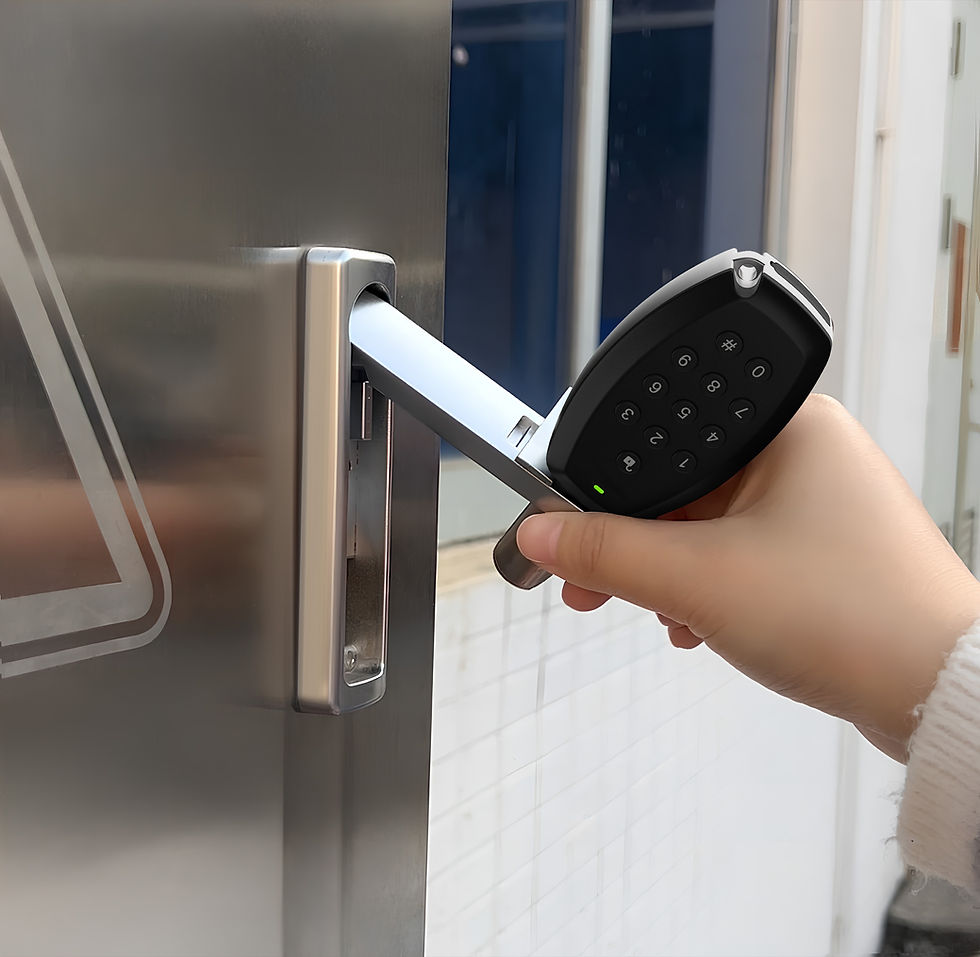Is the industrial environment too harsh? The "passive electronic solution" for rotary handle locks: no fear of dust or water immersion, and no need to change batteries!
- Jul 30, 2025
- 4 min read

In scenarios such as heavy industrial workshops, outdoor base stations, and chemical warehouses, the locks on equipment cabinet doors often face a "triple test": continuous erosion from high-temperature oil and grease, pervasive dust and moisture, and mechanical wear from frequent opening and closing. Traditional mechanical locks are prone to rust and jamming, while electronic locks frequently "strike" due to battery failure. However, a rotary handle lock equipped with "passive electronic technology" is redefining the durability standards for industrial locks.
Passive design: From "battery-changing anxiety" to "once and for all"
The "battery replacement dilemma" in industrial scenarios is far more intractable than imagined:
The battery life of locks in high-temperature workshops can be drastically reduced from one year to three months, and the labor cost for downtime to replace the batteries far exceeds the cost of the locks themselves;
The cabinet door of the outdoor wind turbine tower is tens of meters above the ground, requiring the erection of scaffolding for each battery replacement, with a single cost reaching several thousand yuan;
For explosion-proof locks in chemical warehouses, dismantling the casing to replace the battery may violate safety regulations and even pose compliance risks.
The "passive electronic solution" for rotary handle locks directly addresses the pain point: it eliminates the need for an internal battery and relies on NFC energy induction technology for power supply. When an authorized mobile phone or card reader is brought close to the lock, the NFC signal instantly powers up the lock, completing the identity verification and unlocking process. The entire process is contactless and power-free, effectively eliminating the risk of "battery failure" from the root.
Crucially, the passive design enables the lock body to achieve a fully sealed structure. The casing of this rotary handle lock is forged from 316 stainless steel, achieving a waterproof rating of IP69K (able to withstand direct high-pressure water jets), and a temperature range of -40°C to 85°C. Even if it is immersed in oil, acid, or alkali mist for extended periods, the internal electronic components can maintain stable operation.
Electronic encryption + mechanical anti-tampering: dual protection against industrial-grade brute force
The security requirements in industrial settings have never been about "guarding against the honest but not the dishonest" - once the wires, instruments, and materials inside equipment cabinets are maliciously tampered with, it could lead to production downtime or even safety accidents.
The core competitiveness of this rotating handle lock lies in its dual protection of "electronic encryption" and "mechanical anti-pry":
More precise permission management: Through the supporting management system, multi-level permissions (such as administrator, maintenance worker, temporary visitor) can be set. Each lock corresponds to a unique ID, and remote revocation of permissions is supported, avoiding the risk of "losing control when the key is lost" associated with traditional mechanical locks;
Operational records are traceable: Every unlocking generates an encrypted record (including time, operator, and device number), which is synchronized to the cloud platform. Even if the network is disconnected, the data can be stored locally, and it will be automatically uploaded once the network is restored later, meeting the compliance requirements of industrial auditing;
Mechanical structure resistance to violence: The rotating handle adopts an "idle anti-pry design", ensuring that when subjected to violent twisting, the lock cylinder will separate from the handle, preventing damage to core components. The lock bolt is made of hardened alloy material, with a shear resistance strength of 15kN, far exceeding the 8kN standard of ordinary industrial locks.
"Detail evolution" tailored for industrial scenarios
In practical applications, the "ease of use" of industrial locks is often overlooked. However, the numerous detailed designs of this rotary handle lock precisely address the pain points of frontline operations:
It can be operated with gloves: the handle diameter is thickened to 32mm, and the surface is treated with anti-slip knurling, so that workers can easily rotate it even when wearing heavy labor protection gloves;
Blind operation with precise alignment: The installation tolerance between the lock body and the cabinet door can accommodate ±2mm, ensuring smooth locking even if the cabinet door experiences slight displacement due to long-term vibration of the equipment;
Quick replacement of old locks: The dimensions are compatible with 80% of the industrial cabinet door pre-drilled holes on the market, eliminating the need for re-drilling. Replacing old locks takes only 10 minutes, without affecting production progress.
Currently, this lock has been implemented in various scenarios such as automobile welding workshops, offshore oil platforms, and waste-to-energy power plants. A certain automobile factory reported that after replacing traditional locks, the "unlocking time" for equipment maintenance was shortened from an average of 5 minutes to 10 seconds, resulting in a reduction of 23 hours of downtime caused by lock malfunctions throughout the year. A new energy power station has improved the efficiency of tracing unlocking records of outsourced construction teams by 300% through its permission management function.
The "durability revolution" of industrial locks begins with passive solutions
As Industry 4.0 moves towards "unmanned and intelligent" operations, locks, as the "last line of defense" for equipment security, have evolved beyond being mere "switching tools" and have become important nodes in the industrial Internet of Things.
The passive electronic solution of this rotary handle lock is essentially designed with "low maintenance and high reliability" to meet the stringent requirements of industrial scenarios. It proves that good industrial products are not created by pursuing extreme parameters in the laboratory, but by maintaining stable performance in real environments with oil, dust, and high temperatures.
If your workshop is still struggling with rusty locks, battery failures, and confusing permissions, consider this "maintenance-free" rotary handle lock. Contact us now to obtain customized solutions tailored to different industrial scenarios, transforming equipment security from "constant firefighting" to "once and for all.".




Comments